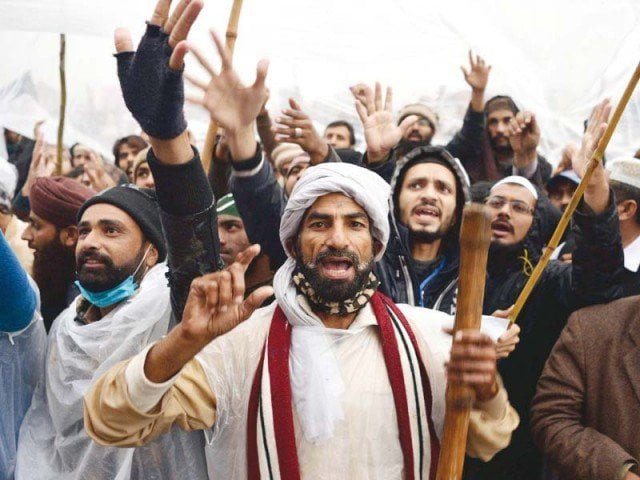Justice Isa’s Faizabad sit-in verdict now favours Imran Khan
Faizabad order says right of assembly cannot be used to overthrow a 'lawful government'

PHOTO: EXPRESS
In the 43-page verdict that was announced on February 6, Justice Isa declared that the right of assembly cannot be used to overthrow a 'lawful government'.
“The right of assembly is recognized as a right to preserve the democratic order, but it cannot be used to overthrow a lawful government. Nor can the right of assembly be used to bring about a revolution or insurrection,” he noted.
Jamiat Ulema-e-Islam-Fazl (JUI-F) is leading the opposition parties Azadi march which is now in Islamabad. The JUI-F chief Maulana Fazlur Rehman has given two-day deadline to Prime Minister Imran Khan to resign. In this scenario, even the government officials are referring to the apex court ruling.
However, when the verdict was announced, the ruling party – Pakistan Tehreek-e-Insaf (PTI) – and the security establishment had expressed reservations over it. A number of review petitions were filed against the judgment. These review petitions are still pending.
Maulana’s two-day deadline has also cautioned the legal community, which has been supporting the JUI-F march. The Pakistan Bar Council Vice Chairman Syed Amjad Shah while talking to The Express Tribune said the bar supports protest within preview of the Constitution but the lawyers will oppose anything against law.
Saiful Malook advocate said Fazl has threatened to arrest the elected prime minister, which is an offence under Article 6 of the Constitution. “I am seriously planning to move high court for registration of high treason case against Fazlur Rehman over these comments,” he said.
The SC’s judgment in Faizabad sit-in said every citizen and political party has the right to assemble and protest provided such assembly and protest is peaceful and complies with the law imposing reasonable restrictions in the interest of public order.
The right to assemble and protest is circumscribed only to the extent that it infringes on the fundamental rights of others, including the right to free movement and to hold and enjoy property.
The court said protestors who obstruct people’s right to use roads and damage or destroy property must be proceeded against in accordance with the law and be held accountable.
The judgment said if anyone propagates, “hatred or contempt, or excites or attempts to excite disaffection towards the federal or provincial government” they commit the offence of sedition for which the punishment is imprisonment for life.
It noted that the Constitution does not specifically stipulate a right to protest. However, democracy recognises such a right, and it is through democratic means that Pakistan was achieved.
“The people of the subcontinent acquired independence from British-colonial rule by the efforts of the All India Muslim League and the Indian National Congress; they peacefully protested, demonstrated, held meetings and expressed themselves through elections, as a consequence of which two independent countries, Pakistan and India, emerged. Our Constitution is moored in democracy”
The ruling said the right of assembly, the freedom of association and the freedom of speech cannot be exercised by infringing the fundamental rights of others. Without obtaining permission, public meetings cannot be held on roads.
“Nor can a road be used as a camping ground or to assemble on it indefinitely. Roads are for vehicular use and pavements are for the use of pedestrians to enable the travelling public to move freely, which is their fundamental right,” it added.
It said when those breaking the law know that there shall be no consequences it only emboldens others.
“The citizens of Pakistan have reposed their trust in the state to ensure that their fundamental rights are upheld. Citizens must be kept safe, their properties protected and they should be allowed to move freely. The State however let them down.”
The court said Pakistan was achieved through democratic and constitutional means.
It held that the police and other law enforcement agencies are directed to develop standard plans and procedure with regard to how best to handle rallies, protests and dharnas, and ensure that such plans/procedures are flexible enough to attend to different situations.
“It is clarified that though the making of such plans/procedures is not within the jurisdiction of this court. However, we expect that in the maintenance of law and order every effort will be taken to avoid causing injury and loss of life,” it said.



















COMMENTS
Comments are moderated and generally will be posted if they are on-topic and not abusive.
For more information, please see our Comments FAQ